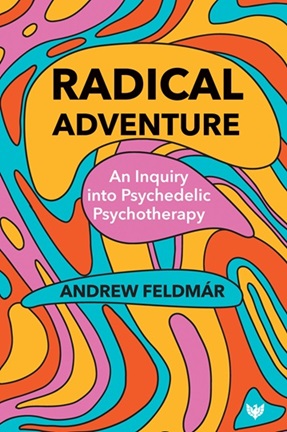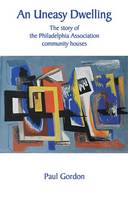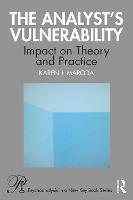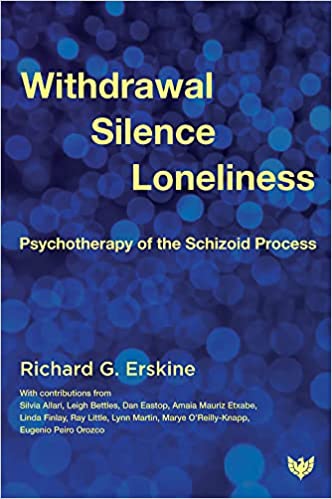Credo: R. D. Laing and Radical Psychotherapy
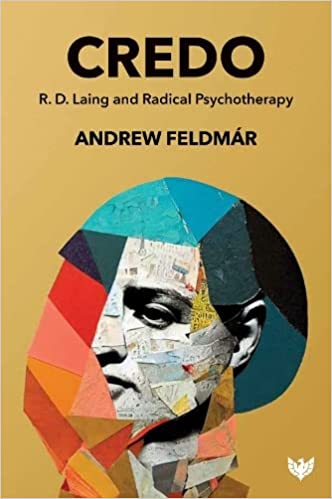
Book Details
- Publisher : Karnac Books
- Published : June 2023
- Cover : Paperback
- Pages : 360
- Category :
Existential therapy - Catalogue No : 97146
- ISBN 13 : 9781800132443
- ISBN 10 : 1800132441
Also by Andrew Feldmar
There are currently no reviews
Be the first to review
Tamás Vekerdy, one of the most well-known Hungarian psychologists, called Credo an ’essential insight not just into Feldmár’s life but into the world and the era that we currently live in.’
Feldmár was three and a half years old when the Arrow Cross came and took his mother to Auschwitz, his father to labour service, and his grandmother to the ghetto. A young Catholic woman hid him for a year and a half – perhaps she inspired Feldmár to become the kind stranger in many other people’s lives years later. Feldmár was sixteen in 1956 when the revolution was crushed, and he escaped from Hungary to Canada all by himself. He fled from bleak prospects and a controlling, critical mother into the unknown. He ended up in Toronto, Canada, and became an academic. In the early 1970s, he met the person who radically changed his thinking: R. D. Laing.
The book’s longest chapter, ’Journal Entries’, comes from notes Feldmár took in 1974–1975 when he studied with Laing in London. He adds notes and remarks in the present to the past, increasing the tension in the already fascinating passages. Following this is the text of an important conversation with Laing, covering topics such as love, therapy, and change. Next is a paper by his lifelong friend Francis Huxley, ’Shamanism, Healing, and R. D. Laing’. The book concludes with perhaps its most influential chapter, ’Fantasy and Reality’. Here, Feldmár speculates on the fundamental elements of his approach to psychotherapy: the nature of responsibility and ethics, politics, freedom, individuality, community, solidarity, will, and relationships.
The bond between Feldmár and Laing permeates every page of Credo. The reader can closely follow Feldmár’s remarkable journey of how their relationship shaped his therapeutic approach and helped him develop into the radical and inspirational psychotherapist he is today. This book is essential reading for all psychotherapists, psychoanalysts, and fans of R. D. Laing.
Reviews and Endorsements
‘I found reading Credo inspiring, even therapeutic, and I think it could be so for many who read it with an open mind and heart. It’s written with careful, attentive observations and questioning of self and others, and with a clarity of intentions and aspirations. It has a lot of jargon-free, undogmatic, uncommon sense.’
Leon Redler, physician, psychotherapist, and researcher
’Andrew Feldmár’s Credo is an amazing memoir, filled with brave personal revelations, a record of his intellectual journeys and accomplishments, his conversations with some of the world’s leading psychologists, philosophers, psychiatrists, and healers –especially R. D. Laing but also Francis Huxley, David Bakan, and others – and his vast reading of the West’s major thinkers. Credo is a guide to Feldmár’s humility as a therapist, his eternal life as an outsider – a Jew, a Hungarian-speaking Canadian – and his ability to always start over again and to “market his pathology” as a compassionate therapist to very diverse populations. I am honored to have worked with him in Vancouver and New York — but even I did not know that Feldmár had founded a Laingian-style shelter (Soteria) for people with psychiatric diagnoses in Hungary or that friends had founded a Feldmár Institute there to popularise his theoretical and practical approaches to psychotherapy.’
Phyllis Chesler, writer, psychotherapist, and professor emerita of psychology and women’s studies, College of Staten Island
‘With an unerring sense of direction, Andrew Feldmár, born into a desperate situation in Hungary, found his way from Canada to R. D. Laing and the milieu around him in London in 1974 (I was there too). His one year of intensive involvement became foundational both for his life and for his career as a psychotherapist, founded in the ethics of ancient wisdom and existential courage. Through many what he calls “magnified moments”, he tells and shows how to fully inhabit one’s own life despite trauma and struggles, as a simultaneous sine qua non for being in communion with anyone else and with all that is. I remember and think of Andrew with respect and personal warmth; his Credo is well worth reading.’
Paul Zeal, MA, writer and psychotherapist
'I found this an intriguing book to read. One can learn much about the formulation of a radical psychotherapeutic method here. [...] we can refer to Credo as a valuable contribution to the world of Humanistic Psychology, amongst other things.'
Murray Gordon, MAHP, Living Psychology
'I found reading Credo inspiring, even therapeutic, and I think it could be so for many who read it with an open mind and heart. I think that may be so for the psychotherapists, trainee therapists and people considering psychotherapy, who may be among its main initial readers. [...] It’s written with careful, attentive observations and questioning of self and others, and with a clarity of intentions and aspirations. It has a lot of jargon-free, undogmatic, uncommon sense.'
Leon Redler, 'Mad in the UK', June 2024
‘The book is such a clarion call to individual freedom, to therapy as “a process by which patients find their own path”, (286 p.) that this feels in keeping with its spirit. […] Feldmár’s role is to provide a place for the patient to be without anyone pressurising them, to encourage them to be themselves by taking them seriously and to demystify their narrative by encouraging scepticism about the stories they tell themselves. It is not to give them certainty, but to help them find something which frees them to be themselves.’
Rose Baring, British Journal of Psychotherapy 00, 0 (2024) 1–3
Table of Contents
EDITOR’S NOTE
PREFACE
by Alphonso Lingis
INTRODUCTION
RUPTURES
First Rupture - My Father
Second Rupture - Irén Igaz
Third Rupture - My Mother
Fourth Rupture
Fifth Rupture
Sixth Rupture
Seventh Rupture - Laing
ORIGINS
JOURNAL ENTRIES 1974–75, LONDON
A CONVERSATION WITH R. D. LAING
Love
Therapy
Forms
Transformations
Lying
Change
SHAMANISM, HEALING, AND R. D. LAING
by Francis Huxley
FANTASY AND REALITY
R. D. LAING’S 12 RECOMMENDED BOOKS
NOTES
ABOUT THE AUTHOR
About the Author(s)
Andrew Feldmár is a Vancouver-based psychologist and psychotherapist. His approach to therapy seeks to reconnect patients to the joys of everyday life through relying on loving, living relationships, rather than the alienation of the classical doctor–patient relationship. He was born in Hungary during WWII (1940), and after the 1956 revolution was defeated, he immigrated to Canada on his own at the age of 16. He graduated with honors from the University of Toronto with a BA in mathematics, physics, and chemistry, as well as an MA in psychology from the University of Western Ontario. He has been a psychotherapist since 1969.
During 1974–1975, he spent a year in London, England, intensively studying and training in the practice of psychotherapy under the renowned and controversial Scottish psychiatrist, R. D. Laing. During this year, he also studied with Francis Huxley (the anthropology of healing), John Heaton (existential psychotherapy), Hugh Crawford (community therapy), and Leon Redler (spiritual emergency). These relationships became lifelong friendships. Feldmár also worked with one of the founders of transpersonal psychology, Stanislav Grof at the Esalen Institute in California. He gained further experience in the field while volunteering at Hollywood Hospital in New Westminster, where LSD was legally used for research and therapy. He gained experience in brief psychotherapy in Palo Alto in the research group of Paul Watzlawick.
He has taught, lectured, and led workshops at SFU, UBC, Emily Carr University, and Douglas College. In 1989, he was a guest on a 3-part CBC Ideas radio series entitled R. D. Laing Today. He has also worked as a consultant in both television and film (e.g., Showcase’s Kink series, Neurons to Nirvana: The Great Medicines). Other career highlights include work with the United Nations; founding the Integra Households Association, a non-profit charity working with those in extreme mental distress; and Third Mind Productions, a film production company that went on to turn out the 1987 film, Did You Used to Be R. D. Laing?
He has also worked extensively overseas, mainly in Hungary, where he has published over 30 books. His first book, The Rainbow of States of Consciousness, is now in its third edition. Two organisations have been set up in Hungary, inspired by Feldmár. The Soteria Foundation was established in 1995 and became a pioneer of community psychiatric care in the country. In 2006, his colleagues and friends founded the Feldmár Institute, in Budapest, in order to popularise his theoretical and practical approach to psychotherapy.
He is well-known to international audiences in the field of psychedelic-assisted psychotherapy, having presented at numerous conferences on the subject. He took part in a research study sponsored by MAPS Canada in 2008 to demonstrate the efficacy of MDMA as an adjunct to psychotherapy in patients with severe PTSD. He was also a mentor in California’s Psychedelic-Assisted Therapies and Research program.
Customer Reviews
Our customers have not yet reviewed this title. Be the first add your own review for this title.
You may also like
An Uneasy Dwelling: The Story of the Philadelphia Association Community Houses
Paul Gordon
Price £14.00
Withdrawal, Silence, Loneliness: Psychotherapy of the Schizoid Process
Richard G. Erskine
Price £32.39
save £3.60


